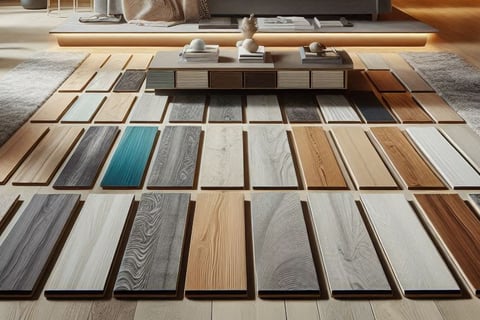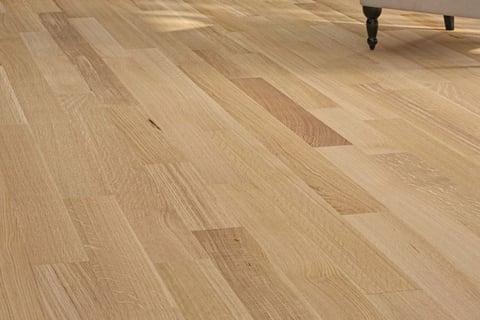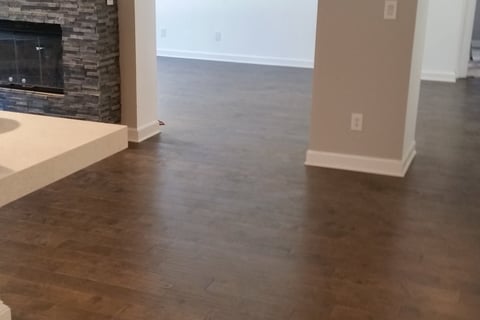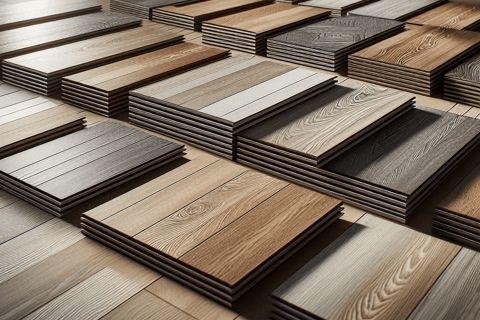Floors plus Quality works with a wide range of hardwood and products designed to enhance any space. These selections includes solid and engineered options, featuring diverse species and finishes for timeless elegance and lasting durability. For versatility and resilience, we offer LVP installations that provide stunning wood and stone designs with water-resistant and low-maintenance features, perfect for busy households and commercial environments."
Flooring Products
Luxury Vinyl Planks
or
LVP


Luxury Vinyl Plank (LVP) flooring has become a popular choice for many homeowners due to its versatility and durability. Here's a breakdown of its pros and cons:
Pros
· Waterproof: Ideal for areas prone to moisture, like kitchens and bathrooms.
· Durable: Resistant to scratches and wear, making it suitable for high-traffic areas.
· Easy Installation: Click-and-lock systems allow for straightforward DIY installation.
· Low Maintenance: Simple to clean and maintain.
· Cost-Effective: Provides the look of hardwood at a fraction of the price.
· Comfortable: Softer underfoot compared to hardwood or tile.
Cons
· Repair Challenges: Damaged planks can be difficult to replace.
· Limited Resale Value: May not add significant value to your home.
· Environmental Concerns: Manufacturing involves chemicals, and some products may emit VOCs.
· Cannot Be Refinished: Unlike hardwood, it cannot be sanded or refinished.
Solid Hardwood Floors


Solid hardwood flooring is crafted from a single piece of natural wood, offering timeless beauty and unmatched durability. Available in a variety of wood species, colors, and finishes, it adds warmth and elegance to any space. Known for its longevity, solid hardwood can be sanded and refinished multiple times, making it a great investment for decades of use.
Pros
· Longevity: With proper care, it can last a lifetime and even increase property value.
· Timeless Appearance: Classic and versatile, it complements a variety of interior styles.
· Refinishable: Can be sanded and refinished multiple times to remove wear and tear or change its appearance.
· Natural Material: Environmentally friendly and non-toxic, as it’s made from 100% natural wood.
· Durability: Resistant to heavy foot traffic and dents, especially when made from harder wood species like oak or maple.
Cons
· Cost: Tends to be more expensive upfront compared to other flooring options.
· Moisture Sensitivity: Prone to warping or expanding in high-humidity areas.
· Maintenance: Requires regular cleaning and care to maintain its appearance and durability.
· Installation Complexity: Typically requires professional installation and is not suited for DIY.
· Not Ideal for All Spaces: May not be suitable for basements or areas with fluctuating temperature and moisture levels.
Engineered Wood Flooring


Engineered wood flooring is crafted to combine the natural beauty of hardwood with greater durability and resistance to environmental changes. It features a top layer of real hardwood veneer, supported by multiple layers of plywood or high-density fiberboard (HDF). This construction enhances stability, reducing the risk of warping or shrinking due to moisture or temperature fluctuations. With a variety of styles, finishes, and wood species available, engineered wood flooring offers a timeless aesthetic suitable for any space.
Pros
· Durability: Resistant to moisture and temperature changes, making it ideal for basements or kitchens.
· Authentic Look: Provides the natural beauty of hardwood with added resilience.
· Ease of Installation: Compatible with floating, glue-down, or nail-down methods, and can be installed over various subfloors.
· Eco-Friendly Options: Uses less solid hardwood compared to traditional hardwood flooring, making it a more sustainable choice.
· Cost-Effective: Offers the appearance of hardwood at a lower price point.
Cons
· Not Refinishable: Depending on the thickness of the veneer, some engineered floors cannot be sanded or refinished like solid hardwood.
· Sensitive to Scratches: May still be prone to surface scratches, requiring protective measures.
· Price Variation: High-quality engineered wood can approach the cost of solid hardwood.
· Potential Emissions: Some products may release VOCs due to adhesive materials used in construction.
Laminate Flooring


Laminate flooring is a cost-effective, durable option that mimics the appearance of hardwood, tile, or stone. It consists of multiple layers: a protective wear layer, a decorative layer with a realistic wood or stone print, a core layer for stability, and a backing layer for moisture resistance. Known for its easy installation and low maintenance, laminate is a popular choice for homeowners seeking style and functionality without the higher cost of natural materials.
Pros
· Affordable: Offers the look of hardwood or tile at a fraction of the price.
· Durable: Resistant to scratches, stains, and dents, making it ideal for high-traffic areas.
· Easy Installation: Features a click-and-lock system for DIY-friendly installation.
· Low Maintenance: Simple to clean and doesn’t require refinishing.
· Variety of Styles: Available in many colors and patterns to suit different aesthetics.
Cons
· Moisture Sensitivity: Not fully waterproof—excessive moisture can cause swelling or damage.
· Cannot Be Refinished: Unlike hardwood, it cannot be sanded or refinished.
· Sound & Feel: May not provide the warmth or authenticity of real wood underfoot.
· Lifespan: Generally lasts 10–30 years, shorter than solid hardwood.
· Environmental Concerns: Some laminate products may contain chemicals that emit VOCs.
BUSINESS HOURS
© 2025. All rights reserved.
Mon-Fri 7 am - 7 pm
Sat 7 am - 3 pm
Sun - Closed
